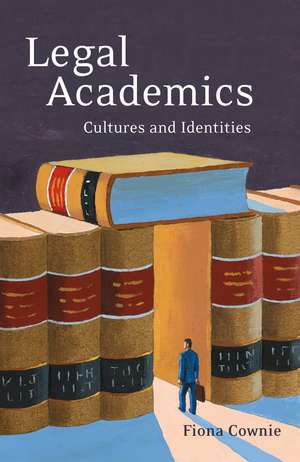Legal Academics: Culture and Identities
Autor Fiona Cownieen Limba Engleză Hardback – 22 ian 2004
Preț: 497.89 lei
Preț vechi: 688.76 lei
-28% Nou
Puncte Express: 747
Preț estimativ în valută:
95.28€ • 98.43$ • 79.30£
95.28€ • 98.43$ • 79.30£
Carte tipărită la comandă
Livrare economică 25 martie-08 aprilie
Preluare comenzi: 021 569.72.76
Specificații
ISBN-13: 9781841130613
ISBN-10: 1841130613
Pagini: 240
Dimensiuni: 156 x 234 x 19 mm
Greutate: 0.5 kg
Editura: Bloomsbury Publishing
Colecția Hart Publishing
Locul publicării:London, United Kingdom
ISBN-10: 1841130613
Pagini: 240
Dimensiuni: 156 x 234 x 19 mm
Greutate: 0.5 kg
Editura: Bloomsbury Publishing
Colecția Hart Publishing
Locul publicării:London, United Kingdom
Caracteristici
This detailed study of the lived experience of legal academics explores not only the culture of legal academia and the professional identities of law teachers, but also addresses some of the most pressing issues currently facing the discipline of law.
Notă biografică
Fiona Cownie is a Professor of Law at the University of Keele.
Cuprins
1 Studying Legal Academics2 Legal Education and the Lived Experience of Legal Academics3 Inhabiting the Discipline of Law4 The Legal Academic Career5 The Experience of Being a Legal Academic6 Teaching and Research in the Legal Academy7 Inside and Outside the Academic World8 Identity Matters9 Conclusion
Recenzii
This is a qualitative study by an experienced 'inside researcher' and it is theoretically and methodologically sophisticated.This book is a significant achievement and deserves to be read by present and potential academic lawyers and those who have to deal with them.
This is an ambitious and stimulating book.The ambition of the book lies in its aim of not only identifying the experiences and views of law teachers but in aiming to define the essential identity of law teachers themselves.the various contexts for the research, especially the literature on 'identity' are thoroughly explored and well presented.The book really comes alive.with the quotes from the interviews, which are well selected.this is a very worthwhile and scholarly effort.
Examining the habits of law's inhabitants, Fiona Cownie found the discipline in flux. This is, according to her, particularly true for legal academics' approach to law..Shedding light on various aspects of the legal academic career, from the initial decision to study law at university to the qualities and skills which contemporary legal academics think are necessary to be a good legal academic.Fiona Cownie presents rather sobering conclusions.
Cownie wants to make legal academia more comprehensible to outsiders and, at the same time, contribute to the debate about what it means to study law.Cownie has managed, with her 'purposive conversations', to tease out some of the latent tensions in being a contemporary legal academic.As a mirror, Legal Academics provides an interesting reflection.
Cownie's rich material gives up much to work with, a valuable body of evidence, and many further lines of inquiry to pursue...establishing a baseline is a difficult task, but one which this work arguably achieves.
Legal Academics is a beautifully crafted book, testifying to its own thesis that law is increasingly connecting with the intellectual mainstream (witness, in particular, the meticulous methodological comments in the first chapter of the book concerning culture and identity and the interaction between the two)...for readers (including law students) who wonder what it is like to be an academic lawyer, and whether academic lawyers actually like being academic lawyers (which, broadly speaking, they do), this book does exactly what it sets out to do and tells it as it is.
Cownie's book is a useful contribution to the small but growing body of research into the self-perceptions of professional identity of the members of different academics tribes.
This is an ambitious and stimulating book.The ambition of the book lies in its aim of not only identifying the experiences and views of law teachers but in aiming to define the essential identity of law teachers themselves.the various contexts for the research, especially the literature on 'identity' are thoroughly explored and well presented.The book really comes alive.with the quotes from the interviews, which are well selected.this is a very worthwhile and scholarly effort.
Examining the habits of law's inhabitants, Fiona Cownie found the discipline in flux. This is, according to her, particularly true for legal academics' approach to law..Shedding light on various aspects of the legal academic career, from the initial decision to study law at university to the qualities and skills which contemporary legal academics think are necessary to be a good legal academic.Fiona Cownie presents rather sobering conclusions.
Cownie wants to make legal academia more comprehensible to outsiders and, at the same time, contribute to the debate about what it means to study law.Cownie has managed, with her 'purposive conversations', to tease out some of the latent tensions in being a contemporary legal academic.As a mirror, Legal Academics provides an interesting reflection.
Cownie's rich material gives up much to work with, a valuable body of evidence, and many further lines of inquiry to pursue...establishing a baseline is a difficult task, but one which this work arguably achieves.
Legal Academics is a beautifully crafted book, testifying to its own thesis that law is increasingly connecting with the intellectual mainstream (witness, in particular, the meticulous methodological comments in the first chapter of the book concerning culture and identity and the interaction between the two)...for readers (including law students) who wonder what it is like to be an academic lawyer, and whether academic lawyers actually like being academic lawyers (which, broadly speaking, they do), this book does exactly what it sets out to do and tells it as it is.
Cownie's book is a useful contribution to the small but growing body of research into the self-perceptions of professional identity of the members of different academics tribes.
Descriere
This book explores the culture of legal academia, the professional identities of law teachers and the issues facing the discipline of law.
